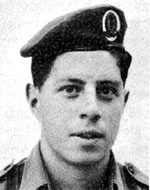Halevi-Levin, Aviezer (“Avi”)
Son of Yitzhak and Ahuva. He was born on Wednesday, February 13, 1948. He was five years old when he was admitted to first grade at the Ma’aleh school where he completed his elementary studies, and later attended the “Nativ Meir High School” Where he completed his studies and he is only between seventeen. He studied for one year in the high yeshiva “Dabana Cemetery”. In his studies, he was very successful and brought great satisfaction to his parents. He loved music and played piano, and his hobby was building airplane models. He was drafted into the IDF in July 1966, as part of the “Shalhevet” nucleus of the Ezra youth movement, and on the day of his enlistment, when he parted from his mother before leaving for the army, he said: “Mom, not a single gray hair! Do not worry, everything will be all right. “After basic training, he was sent to a squad commander’s course. As a lieutenant colonel, he guided the Nahal recruits’ base and the “Ma’ale Gilboa” outpost. In a short time he became one of the guys. Although he managed to maintain his position as commander, he participated in conversations with his friends in the evenings, sitting together on a cup of coffee and sharing experiences with them. He would listen and tell, travel with them – and even “run wild” inside them without any barriers. However, when he assumed his role as commander, he was meticulous and kept vigilant on every detail while filling it. In the nighttime work he would show his concern for the guard soldiers when he accompanied the female soldiers on their patrols to distribute hot coffee to the guards for the guards to enjoy. These tours were spiced with jokes and glued the girls with the gaiety she sang about him. In the Six Day War, he fought on the Golan Heights front. From the war he wrote: “Do not worry, I say again not to worry, what I see before me can give enough courage to the cowardly cowardice and everyone in the country.” He later went to an officer’s course and when he graduated from the officers’ school he was assigned to the Golani Brigade. He reached the rank of lieutenant-colonel, but on the 12th of Shvat 5729 (31.1.1969) he fell on a night patrol while carrying out his duties. It was in the Golan Heights. Was laid to rest in the military cemetery on Mount Herzl in Jerusalem. After his death he was promoted to lieutenant. His commander wrote about him and described his image: “My father served in our unit as a staff officer and commander of a mortars department, and in both of his positions he was closer to me than the other young officers in the unit – both because of the nature of the position and because of his special character. He came to the conclusion that there was room for improvement and consolation did not hesitate to express his opinion and offer, and sometimes he would struggle with his friends and commanders to convince them of the rightness of his path – all with passion, faith and recognition of the justice of his path. In the opinion of others, senior officials of his position and rank, as commander of the Marg department My father was really a phenomenologist, he received a disorganized platoon which was without a commander for many months and within a minimal period of time and under strict conditions of trust he managed to bring it to the highest level … … My father was not a regular platoon commander … Everyone knew him and everyone loved him. He was always interested in what was going on in the battalion and pressured me in every activity. He volunteered for every position. His fall was characteristic of his path. When it was necessary to go on a night tour in the Golan Heights and the driver was not fit to do so, he volunteered to leave. We will remember him as one of our best commanders and will continue his path in faith. “In the Yeshiva of the” Nativ Meir High School, “a study room was established in his name, and a library was named after his friend Michael Gross. On the first anniversary of his death, his friends in the “Shalhevet” nucleus of the Ezra youth movement published memorial pages that joined the booklet and was called “Aviezer.” Shortly after the death of Aviezer, his father died of grief and grief.
